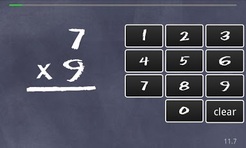Interesting list...Check it out here.
It is amazing how creative kids can be...And not just creative, but also detailed oriented. Check out this Interview with Johnathan Ive on Blue Peter. All great designs... I will have to try at least couple of these apps. Check out: 15 Apps for Improved Reading.
Long, long time ago...when I was learning how to read, the process did not seem to be difficult at all. I learned my letters. In my native language, each letter is a unique sound as well. Learning how to read in comparison to learning how to read English, seemed much easier. I even learnt to read in two different alphabets, Latin and Cyrillic, by the age of 6. But again, it did not seem hard. I even remember the moment, when it clicked. Couple of years later, I started learning English. Learning how to read in English was harder but I was older and used a number of association methods to recognize the patterns and read. To be honest, it was more of a memorization and association exercise. Today, I can read English well. But, it is still my second language and my comprehension is not at the level it should be. Although, my theory is that due to my still fairly limited vocabulary, I make lots of assumptions about the meaning of certain words based on the context around it. Hence, I can read the word. I can read the sentence, but the lack of familiarity with the word does not yield proper association and limits my comprehension. Today, I watch children learning how to read English. I watch them struggle, and feel that perhaps they are just too young to master it. Applications like these will  John and Erol have been collaborating and making new updates to the TimesTables App. It should be coming out soon...stay tuned. In the meantime, there are so many good and rewarding reviews.
There is nothing more rewarding than a positive review on your own creation... here is the latest one that came through the email. " Iman Hussein - January 30, 2013 - Version 1.1 Amazing This app has really helped me improve with my times tables and it's fun at the same time, I thank who ever made this app!!" Thank you Iman for your kind words and encouragement to make it even better... While casually surfing my Facebook wall, I came across this absolutely inspiring video from a 7-year old CA boy. He is a walking commercial for this site... Thank you, Tristan.
NOTE: I do not know this boy nor his family. Hence, they may ask me to remove this video from this site. But, at least for the moment, I wanted to share the inspiration. <iframe src="http://www.facebook.com/video/embed?video_id=10151509195699913" width="480" height="720" frameborder="0"></iframe> My husband and I struggle with our 8 year old homework on a daily basis. He would do anything else but the homework. He'd read other books (ones not assign as part of the homework), do online math, play Mine Craft for hours...
If you have a similar challenge, some of the ideas in this blog may be of help. See here. This fall, I have been taking couple of courses from Stanford Venture Lab. Initially, I signed up for 3 courses but realized, very soon, that 1 course is just the right challenge for me. Especially with the workload from my day job.
On of the courses is Crash Course on Creativity. A great, creative adventure, I must say. It forces one to think outside of the box...and be truly imaginative. This is the type of course I could take online anytime and always learn something new. From that perspective, I also made a generic assumption that this type of course would be the easiest to each to online audience. However, it is interesting to see that teachers of large online course have similar all around challenges, independent of the type of course they teach. Compare the notes of Fred Wilson (from my previous post) and the e-mail below from the teacher of this course. Fairly similar one might say... "Hi All, Thanks to all of you who spent the time responding to the mid-course survey for the Crash Course on Creativity. There are over 1.700 responds and I have read all 800 of the comments. They were very helpful! Here are the high level findings: We have an incredibly diverse class in terms of age, education, background, and culture. Most participants have a college or graduate degree, experience with online tools, and are between 20 - 40 years old. The vast majority find the assignments to be of the right level of difficulty, and have found the course content and assignments to be valuable or very valuable. A large percentage of people have found the team projects frustrating because of team formation, communication, and collaboration issues. Most participants find the class interesting, educational, enjoyable, and inspiring. I want to use this opportunity to provide you with my thoughts on the course and to respond to common comments. I hope this is helpful to you. 1) Diversity of class/Level of instruction: The course has a large number of participants with a huge range of backgrounds. My goal has been to provide an experience for anyone, anywhere in the world. I am pleased that most people find the assignments to be at the right level, and urge those who want more to push the limits on the projects, and to read articles and books (including mine) that dive into the material much more deeply. I am a huge believer in experiential learning. That is why the class focuses on taking on challenges. You can watch endless videos and read lots of books, but you will never master the skills unless you use them. I tried to design the challenges to be relevant to anyone, of any age, anywhere in the world. 2) Open ended assignments: I have received lots of questions about the assignments, asking for more detail. The challenges are designed to be open ended and open to interpretation. I spent a lot of time crafting each of the assignments. They might look simple on the surface, but they are really quite complex, inviting you to look at them in endless ways. Use them as a chance to push beyond your immediate interpretation to find opportunities that are less obvious. I encourage you to spend more time thinking about them at the beginning before diving into the execution. 3) Feedback/evaluation on projects: With a class of 39,000 students it is impossible for me to evaluate each assignment. I wish I had a dozen teaching assistants who could do this, but it is only me. Please keep in mind that these assignments are for you, not me. There are no grades in this class, it will not be on your transcript, and nobody is going to get punished for turning in something that is "wrong". (I get lots of messages from people who are concerned about punishment.) The assignments are designed to help you unlock your creativity. Please look at them as gifts, not homework... I hope you will share them with your friends, family, and colleagues, so that you can all talk about how you might tackle these challenges. The more you put into them, the more you will get out of them. Promise! 4) Team Projects: Teamwork is hard, even under the best circumstances. And, it is even harder when you are working with people you don't know, in different time zones. However, when it works, it is really worth it. That's why I decided to try it out in this class. It was a bold experiment... I know that the team formation process has been frustrating for many of you. For others is has been a pleasure, as you get to work with really interesting people around the world. After we started, I realized that it was a mistake to start with a team project, and to change teams for the next group assignment. There are many people who signed up without any intention of participating, and it was impossible to know who they are until we started the class. If I offer the class again, I will handle this very differently. Keep in mind, when things don't go smoothly for you, the problem is much bigger for me. :) 5) Difference from a Traditional Class: An online class with 40K students is really different from a traditional class with 40 students. People have vastly different levels of engagement, time, etc... Also, it is impossible to look everyone in the eye to make sure that each person is paying attention and understands what is happening. It also means that things can't change quickly. In a small class if things aren't working perfectly, they can be changed quickly. I am doing my best to make modifications to our course as challenges arise... Please understand that it is like building an airplane while you are flying it. Thank you to all those who have joined in this experiment. I hope you are learning as much as I am. Creativity Rules! Tina " Over the last couple of months, I have been taking a number of online courses. i have embarked on this journey as part of my personal curiosity about the benefits/differences of online learning vs. traditional classroom learning.
Here are some of my learning challenges in an on-line environment:
I have never bee a teacher and have never taught any classes on-line or otherwise. As such, I am not in a position to provide my view on challenges of on-line teaching. But here is what Fred Wilson from USV had to say about his on-line teaching experience: "I've enjoyed teaching the Skillshare class on Sustainability. I've learned a few things about the hybrid class model and I have shared them with the Skillshare folks. It's tantalizing to think about the power of teaching a class to 2,731 people at one time. But when I compare that to the power of teaching 75 people in person, the hybrid model shows it's weaknesses. I need the real-time feedback from the students in the class. I need to see if folks are getting what I am saying or if eyes are glazing over. I need to know if I need to take another tack on the material before moving on. And I don't get that with a massively open online approach." See more of Fred's blog on this topic here. In the process of learning, it appears that teachers need real-time feedback just as much as students... Hence, if you are building an online learning environment, make sure to incorporate two-way feedback look. An interesting experiment...what do you think?
What do you think? "The ability to innovate takes the ability to dream. When we are five years old, we know what we want to be when we grow up. When we are 45, many of us have lost our way. " Read more here.
|

 RSS Feed
RSS Feed